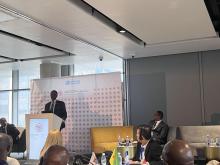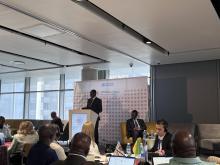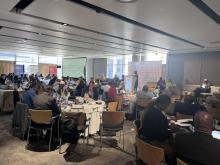Working Together Towards Malaria Elimination
Close to 100 participants representing countries and areas who are part of WHO’s Elimination-2025 initiative, WHO staff from the Headquarters, Regional Officers, and Country Offices, members of the WHO’s Technical Advisory Group on Malaria Elimination and Certification, as well as observers came together in Cape Town, South Africa during the 4th Annual Global Forum of Malaria-Eliminating Countries. Held from 24 through 26 January 2023, the forum was convened by the WHO Headquarters and South Africa Country Office in close coordination and collaboration with the National Department of Health of South Africa.
The purpose of the forum was to convene countries that are close to malaria elimination to highlight achievements, report on their progress, share lessons learned, discuss WHO guidance and strategies, and identify gaps in their national plans for elimination.
While delivering his opening address, Dr Sibongiseni Dhlomo, Deputy Minister of South Africa’s National Department of Health warmly welcomed all the participants and thanked WHO for organizing the forum in South Africa which is part of E-2025 initiative and very close to eliminating malaria. Dr Dhlomo further noted that “ The malaria map is gradually, if not rapidly, shrinking. At the turn of the 20th century, endemic malaria was present in almost every country. During the years 1955 to 2018 the disease was eliminated in 111 countries and 34 countries are advancing towards elimination. We understand elimination as the absence of transmission in a defined geography – typically a country.”
In 2017, WHO began a special initiative to accelerate malaria elimination known as the Elimination-2020 (E-2020) to help countries achieve their malaria elimination goals and worked with 21 countries with the potential to eliminate malaria by 2020. With demonstrated success and the conclusion of the E-2020, WHO launched the E-2025 initiative as a follow-on effort.
“ Since 2017 three Global Forums of Malaria-Eliminating Countries were conducted: 1st in Switzerland, 2nd in Costa Rica, and 3rd in China. For the first time the Global Forum of Malaria-Eliminating Countries is hosted in the WHO African Region. This demonstrates that elimination of malaria is on the public health agenda of Africa. This is also an opportunity to underline that getting to zero malaria is a viable goal for all countries, no matter how near or far they may be from that target today.” highlighted during his speech Dr Owen Kaluwa, WHO Country Representative in South Africa.
The presentations and discussions throughout the forum focused on reviewing the progress and challenges related to malaria elimination efforts. Experiences were shared from the WHO African Region and malaria elimination in South Africa. During the group works the participants reflected on challenges and proposed practical solutions to accelerate malaria elimination.
An award ceremony was organized at the end of the first day to recognize El-Salvador and China reaching the malaria-free status. Awards were also given to countries who achieved significant milestones in their work towards zeroing in on malaria. South Africa received accolades for mobilizing domestic resources to tackle malaria.
Best practices from the E-2025 countries who successfully and significantly curbed malaria cases and the lessons learned during their work was shared during the second day. WHO’ Global Malaria Programme team members updated the audience about the latest the WHO’s guidelines for malaria and other accessible tools and resources that can be used while planning and implementing the antimalarial activities.
Prevention of re-establishment of malaria transmission requires equally strong and continuous attention and action to which was dedicated the last day of the global forum. Representatives from China and El-Salvador walked the participants through their respective countries’ experiences on holding back malaria transmission.
It is encouraging and commendable to see national governments drive and own malaria elimination work. WHO plays an important role in supporting, tracking, and certifying malaria elimination and in ensuring that the best technical strategies are adopted to help achieve or accelerate elimination in countries that have identified elimination as a goal.



